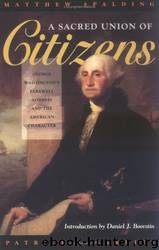Sacred Union of Citizens: George Washington's Farewell Address and the American Character by Matthew Spalding & Patrick J. Garrity & Daniel J. Boorstin

Author:Matthew Spalding & Patrick J. Garrity & Daniel J. Boorstin [Spalding, Matthew & Garrity, Patrick J. & Boorstin, Daniel J.]
Language: eng
Format: epub, mobi
Tags: History, Patriot Bookshelf
ISBN: 9780847682621
Publisher: Rowman & Littlefield
Published: 1996-01-01T00:00:00+00:00
Mather’s work became a survey of diseases. One of the proposals for its printing called it “An Essay upon the Common Maladies of Mankind: offering, first, The Sentiments of Piety, whereto the Invalids are to be awakened in and from their bodily Maladies. And then, a rich Collection of plain but potent and approv’d Remedies for the Maladies.”
The book made no claim to originality. “Nor, can it be Expected,” Mather explained, “that while Colonies are yett so much in their Infancy as ours are, and have had so many Serpents also to crush while in their cradles as ours have had, they can be so circumstanced as to produce many acute mathematicians, or allow them the Leisure for extraordinary Inventions and Performances.” But Mather did himself an injustice: by the very organization and emphasis of his volume he had put himself among the most progressive medical students of his day. The idea of the separateness of diseases had only begun to make headway abroad. Until the middle of the 16th century the dominating concern of European medical men had been “the general state of the system” of which all diseases were thought to be mere variants. Only with the work of Paracelsus in the Renaissance was there a serious revival of the idea that there were many different diseases, each with its own causes and cures. In the 17th century the English physician Sydenham insisted that particular diseases might be as different as particular plants and animals, and that therefore they must be examined and classified in detail. How little progress had been made by 1700 appears from the fact that there were then known only two specific drugs (cinchona bark yielding quinine against malaria; and mercury against syphilis); even these had probably come directly from folk-medicine.
Mather’s “Angel of Bethesda” expressed an empirical view alien to many learned European doctors. He showed himself less interested in the “causes” than in the remedies of diseases; his pages abound in what he called “remarkable, and often experimented” cures. In a chapter on the “Uncertainties and Contradictions” of Physicians, he illustrated the vagaries of learned doctors by their contradictory prescriptions for the consumption. “And here,” Mather explains, “we will not concern ourselves with the Differences among the Physicians, about the Cause of this Distemper; (whereupon, who can read the Collection made by Dolaeus, and not cry out, The Diviners are mad!) but only see, how they differ about the Cure of it.”
His hope that there might be a way to save the New England community from the scourge of smallpox was aroused by an item he read in the Transactions of the Royal Society of London for 1714. This was a letter from a Turkish doctor describing how “inoculation,” or the deliberate infection of a healthy person with matter from a person suffering from the smallpox, usually produced a light case of the disease from which the patient recovered, and to which he was thereafter immune. Mather then wrote to a doctor in
Download
Sacred Union of Citizens: George Washington's Farewell Address and the American Character by Matthew Spalding & Patrick J. Garrity & Daniel J. Boorstin.mobi
This site does not store any files on its server. We only index and link to content provided by other sites. Please contact the content providers to delete copyright contents if any and email us, we'll remove relevant links or contents immediately.
The Secret History by Donna Tartt(16611)
The Social Justice Warrior Handbook by Lisa De Pasquale(11486)
Thirteen Reasons Why by Jay Asher(7783)
This Is How You Lose Her by Junot Diaz(5755)
Weapons of Math Destruction by Cathy O'Neil(5032)
Zero to One by Peter Thiel(4818)
The Myth of the Strong Leader by Archie Brown(4787)
Promise Me, Dad by Joe Biden(4441)
Stone's Rules by Roger Stone(4413)
Beartown by Fredrik Backman(4407)
How Democracies Die by Steven Levitsky & Daniel Ziblatt(4393)
The Fire Next Time by James Baldwin(4338)
100 Deadly Skills by Clint Emerson(4072)
A Higher Loyalty: Truth, Lies, and Leadership by James Comey(4028)
Rise and Kill First by Ronen Bergman(4009)
The David Icke Guide to the Global Conspiracy (and how to end it) by David Icke(3877)
The Farm by Tom Rob Smith(3870)
Secrecy World by Jake Bernstein(3774)
The Doomsday Machine by Daniel Ellsberg(3726)
